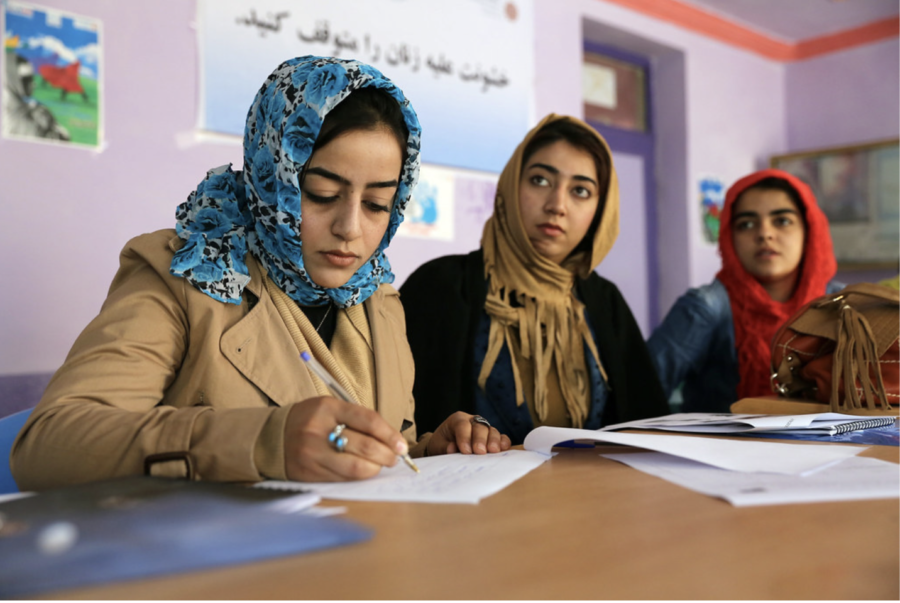The Taliban Bans Women From Universities
Photo by Creative Commons
Afghan women take a photojournalism course at university in Farrah City, Afghanistan.
February 8, 2023
Women’s rights in Afghanistan are being stripped away, and there needs to be more of a global spotlight on the issue. Most recently, Afghan women have been banned from universities under Taliban rule. This ban creates a devastating domino effect on the lives and futures of Afghan women. One Kabul University student explained in a statement to BBC, “They destroyed the only bridge that could connect me with my future.”
Initially, in the 1990s, the Taliban emerged after the Soviet Union withdrew forces from aiding the Afghan communist government in the Afghan War. Islamic guerrilla or Afghan mujahideen, the anti-communist party that overthrew the existing government, consisted of young Pashtun tribesmen from East and South Afghanistan and from some parts of Northern and Northwest Pakistan. Pashtun were religiously educated men that preached Sunni Islan, and they wanted to restore the order of their country by overthrowing the government and reinstating Sharia law, which they thought would bring back peace and stability to the country that was lost under the corrupt Afghan communist regime.
After the mujahideen successfully overthrew the government in 1992, the whole country—except the capital Kabul—was in chaos. Towns would frequently be subject to extortion and assault from local militias and warlords. However, people quickly turned their support to the mujahideen, who slowly defeated the various terrorizing warlords and militias. Eventually, mujahideen gained total power over many Afghanian factions; this movement would eventually become known as the Taliban. By 1996, the Taliban had taken over Kabul and now had power over two-thirds of the country.
However, the Taliban quickly became corrupt as they asserted their own strict and repressive interpretation of law and order. Under this law, women had become almost completely banned from public activities, including education and employment. Then, in 2001, with the help of the US, the Taliban was overthrown. But, the US was not able to capture all the head figures of the organization, and the group, through the 2000s and 2010s, regrouped and began to grow once again. Finally, in August of 2021, after the US had left the country, the Taliban gained enough power to incite a successful attack on the capital, regaining their power over the country.
After two decades of being ousted from power, the Taliban reclaimed their hold on the Afghan government and have enforced many drastic changes with full force. Many of these rules have greatly affected the country’s female population. As of January 2023, women have been banned from going to parks, gyms, sports, public baths, and higher education. Women have also been forced out of government jobs, and their salaries have been slashed.
In late December of 2022, the far-right nationalistic militant group had already taken away women’s secondary school education. In hopes of reversing their rule, many women and men marched and protested in the capital, Kabul, but were quickly shut down by Taliban officers.
The Taliban regime’s goal is to “return” Afghanistan to adhering to stricter Islamic values, which, in turn, would make the country a safer and more secure place. In Afghanistan, the primary sect of Islam is Sunni. Under such practices, women are supposed to be fully clothed, covering their faces in public.
These women and girls are being treated as second-class citizens. Women are forced to quit their jobs and have to carry the name of a male figure, like their father or husband. These laws extend as far as only allowing women to travel certain distances with male supervision and permission.
This discrimination against women has caused concerns globally, including at Lake Forest Academy and the Amnesty Club. Amnesty student leader Ambika Gupta explained, “Last year, we worked with Refugee One – an organization helping Afghan women – by holding a bake sale and raising about $1000”. Gupta went on to say how they also held a drive for pots and pans, which they delivered to Refugee One on service learning day. She continued, “This is not just an issue of Afghan women, but of women all over the globe.”
The United Nations [UN] called the ban a devastating step backward and are deeply concerned. UN Human Rights High Commissioner Volker Türk stated that the ban is a clear violation of Afghanistan’s obligations under international law.
A woman’s ban on education will have everlasting effects. Dr. Mike Hall, a math teacher who got his Ph.D. in mathematics self-efficacy and gender studies *find real title* spoke on this ban. “Women’s success in higher education has been dismissed. For many years scientists and researchers have said and believed that men are naturally better at math than women.” Through his dissertation research, Hall found that these unsupported conclusions were, in fact, wrong.
Hall described his findings, “The commonality that I found was that the girls who were doing best in math had something in their background such as educated parents.”
Hall agreed that Afghanistan’s ban on women’s higher education would have lasting effects for generations. It’s especially important for young girls to have educated parents or a female role model to look up to. If the Taliban’s laws against women continue to populate at their current rate, generations of future children will be impacted as heavily as their mothers, sisters, and grandmothers are now.






































